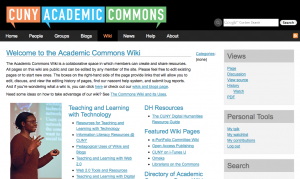What are we really asking when we ask people to contribute to a crowd-sourced project? What do they gain? What are the ethics or politics? Is it best to ask people who have something to gain from using the resource? What’s the difference between volunteerism and unpaid labor?
I’ve been wrestling with these questions as I learn to edit and contribute to the wiki section of the CUNY Academic Commons, particularly the CUNY Digital Humanities Resource Guide.

The CUNY Academic Commons Wiki.
Even though wikis are supposed to be loose and crowdsourced, it seems like some oversight is beneficial—guard against trolls, monitor for double entries, monitor (to an extent) for appropriateness and accuracy, keeping sources up to date. A participant in last semester’s GitHub workshop commented on the lack of alphabetical organization in that section. I joked that we call it “crowd-source casual,” and he knew understood the platform’s ebb and flow. But it did bring up the point that readers been socially trained/programmed to consume information in certain structures, and being bombarded by lists and a jumble of information can feel disconcerting to users who aren’t used to the visuality of a wiki.
However, a crowd sourced platform doesn’t have to be at the mercy of chaos. We see large-scale responses to this with Wikipedian in residence programs or Wikipedia edit-a-thons (like an Art and Feminism one held last week) designed to help balance under-served communities and topics. These are constructed events designed to help counteract the learning curve and encourage both interest and action.
Beyond the philosophies of editing, I’ve been trying (with varying degrees of success) to get new contributors interested in plumping up the offerings and updating resources. It was an interesting study in various types of rhetoric.
For instance, there’s the rhetoric of charity contributions–references to karma, paying it forward, and helping the next generation of scholars. This one appeals to DH practitioners who are often willing to share, but falls short when swamped academics are simply too busy to take on anything new.
There’s the rhetoric of sales that focuses on tangible benefits. The lesson here might be that letting people know from the beginning what they’re getting themselves into–in this case a casual commitment with low stakes while they learn a new skill–may encourage enthusiasm and action. Attribution can be an issue for some users. In a recent post, Laura reflected on her colleagues’ resistance to uncredited contributions on another wiki project. Notably, contributors to the Commons wiki are noted on pages they edit. Might a significant contribution be worthy of a line on a cv or a mention in a cover letter? It points to skills like collaboration, proficiency in wiki markup language, and writing/editing for a general audience.
I also explored the rhetoric of marketing, doing research in order to focus the message better. I perused Paul Jarvis’ new book about succeeding on the web, and tried tried using the vocabulary of project management. It wasn’t particularly enlightening for recruitment, but it sparked ideas about editing and monitoring a group site. (For readings, see the 11/15/13 section in the DH Praxis seminar syllabus).
I realize that several of these lean on vocabularies of monetary contributions, and in that light, it’s particularly relevant to point out Andy’s work on digital labor. Time is money, and it’s important for people to know how and why their contribution of time and information could make a difference.
These all lead to another important question: what’s the fastest way to train people to use/understand the wiki in order to make that contribution as efficient as possible?
There’s a bit of a learning curve to wiki markup language (although I found that a quick search on Wikipedia provided enough information to get me started). With a new understanding of how crowd-sourced projects open up the dialogue around attributions, digital labor, and building communities online. I’ll be brainstorming ways to makes this easier in the coming months,
The bottom line, I’ve realized, is knowing whether the people you expect to use the resource are the ones who would be contributing. If it’s a beginner’s resource, you might be looking for more experienced practitioners to contribute. If it’s for a set of users with a sophisticated skill set, few people will be able to contribute. There are two audiences to consider with a wiki: the reader/user and the contributor/editor. They can certainly overlap, but it’s important to consider both.
Further reading:
“Digital Humanities and Crowdsourcing: An Exploration” an article presented at theMuseums and the Web 2013 conference by Laura Carletti, Gabriella Giannachi, Dominic Price, Derek McAuley.
“Rules of Crowdsourcing: Models, Issues, and Systems of Control” by Gregory D. Saxton, Onook Oh, Rajiv Kishore in Information Systems Management, Vol. 30, Iss. 1, 2013.

